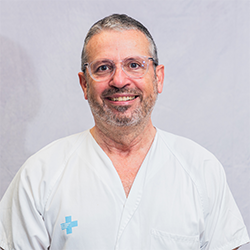The HIV research line receives Gilead’s Prisma Grant for the Healthy Connections project
29/01/2026
A study led by the Foundation for the Fight Against Infections and CEEISCAT concludes that anal cancer screening for people with HIV should be a priority if they have previously experienced severe immunosuppression. This finding could lead to resource savings for the public health system and prevent high-resolution anoscopies in individuals at low risk, thus minimizing potential negative effects on their emotional well-being in indefinite screening programs.
Recently, the prestigious journal The Lancet HIV published a notable article highlighting the study conducted by Dr. Josep M. Llibre, a researcher at the Fight Infections Foundation and a physician at the Infectious Diseases Department of Hospital Universitari Germans Trias i Pujol, in collaboration with Dr. Raquel Martín-Iguacel, Vigilancia Epidemiológica, Monitorización y Evaluación del VIH, las ITS y las Hepatitis Víricas – CEEISCAT.
The research presents clinically significant results based on the PISCIS cohort study, a population study group of people with HIV from Catalonia and the Balearic Islands. These results emphasize the importance of setting priorities in anal cancer screening programs for individuals living with HIV. This retrospective study was conducted across 16 hospitals in Catalonia and the Balearic Islands, including 14,238 people with HIV who began their follow-up before starting antiretroviral treatment, and 107 patients diagnosed with anal cancer.
Anal Cancer Screening in People with HIV
People with HIV are at a risk of developing anal cancer that is 40 to 100 times higher than that of the general population. The ANCHOR study demonstrated that treating precursor lesions, such as high-grade squamous intraepithelial lesions (HSIL), significantly reduces the risk of progression to anal cancer. This highlights the urgent need to implement efficient screening protocols to diagnose and treat these lesions in high-risk populations, such as people with HIV. However, these programs are costly and complex, and the risk of anal cancer is not uniform among all individuals with HIV. Additionally, these programs require specialized techniques and human resources, and there is currently a shortage of certified anoscopists to perform these screenings across all centers and countries.
Even in developed countries, many centers have not implemented adequate follow-up programs, highlighting the need to strategically prioritize patients in screening efforts. The International Anal Neoplasia Society recommends performing anal cytology and/or genotyping of high-risk human papillomavirus (HPV) strains every 12-24 months for the entire HIV population indefinitely. However, this follow-up has yet to be implemented in most countries.
People with HIV who have had a weakened immune system in the past are most vulnerable to anal cancer
In the PISCIS cohort study, a direct relationship was identified between the historical low point in CD4 cell count and the risk of subsequently developing anal cancer over the years. Immune system weakening, combined with active HIV replication before starting antiretroviral treatment and replication of human papillomavirus (HPV), are key factors that can initiate a carcinogenic process, which over time can lead to the development of anal cancer.
 «The data we present in this study is very relevant because it shows that anal cancer screening should be prioritized for people with HIV who have previously had a historically low CD4 cell count», says Dr. Josep M. Llibre. «This would avoid unnecessary resource expenditure by screening other people with HIV who do not actually have an increased risk compared to the general population».
«The data we present in this study is very relevant because it shows that anal cancer screening should be prioritized for people with HIV who have previously had a historically low CD4 cell count», says Dr. Josep M. Llibre. «This would avoid unnecessary resource expenditure by screening other people with HIV who do not actually have an increased risk compared to the general population».
 For her part, Dr. Raquel Martín-Iguacel highlights: «This is the first time it has been identified that people with HIV who have a historical CD4 cell count above 350 cells have a risk of developing anal cancer similar to that of the general population. This confirms that anal cancer screening programs for people with HIV can be optimized by identifying the risk in each case. This strategy would allow for more efficient use of resources and ensure that those at high risk receive appropriate follow-up».
For her part, Dr. Raquel Martín-Iguacel highlights: «This is the first time it has been identified that people with HIV who have a historical CD4 cell count above 350 cells have a risk of developing anal cancer similar to that of the general population. This confirms that anal cancer screening programs for people with HIV can be optimized by identifying the risk in each case. This strategy would allow for more efficient use of resources and ensure that those at high risk receive appropriate follow-up».
Prioritizing Screening for People with Depressed Immune Systems
The study led by Dr. Llibre and Dr. Martín-Iguacel suggests that a historical threshold of more than 350 cells per μL could be a good indicator for identifying individuals at risk of developing anal cancer similar to the general population. Therefore, it might not be justified to subject these individuals to priority screening programs with the same intensity required for those with a historical CD4 cell count <200 cells per μL. This conclusion is particularly relevant, as undergoing annual indefinite anal screenings, including anal cytology and high-resolution anoscopies when cytology is abnormal, can lead to adverse emotional, social, and behavioral effects.
Age as a Risk Factor
Another crucial factor to consider in the screening of people with HIV is their age. The analysis of the PISCIS cohort has shown that no cases of anal cancer have been recorded among men who have sex with men under 30 years old with a historical CD4 cell count above 200 cells per μL.
In fact, in the PISCIS cohort, the highest rates of anal cancer incidence have been observed in individuals aged 60 or older. The consensus guidelines from the International Anal Neoplasia Society recommend starting screening at age 35 for men who have sex with men and transgender women with HIV, but they do not specify an upper age limit for continuing screening. Therefore, the data from the PISCIS study should be considered significantly in decision-making about anal cancer screening in patients, particularly to tailor protocols to specific needs based on age and other risk factors.
In conclusion, these findings will be especially relevant for identifying people with HIV who are being followed up in units where anal cancer screening programs are not implemented and therefore should be referred to specialized centers. Additionally, for those who have left screening programs due to fatigue or exhaustion, physicians now have solid evidence to identify higher-risk cases and resume follow-up when necessary.

Share